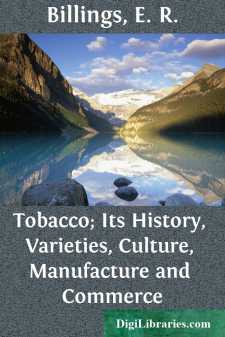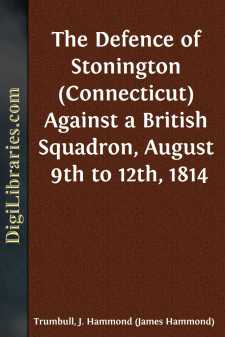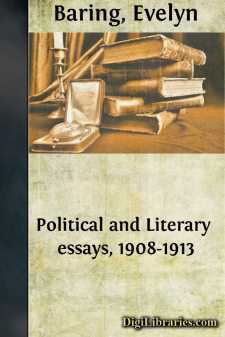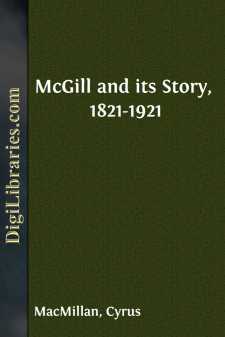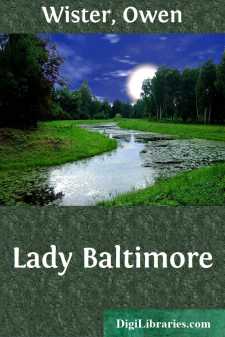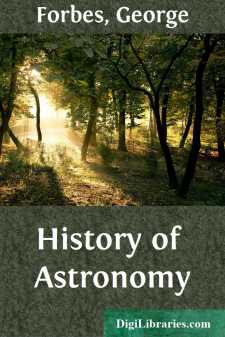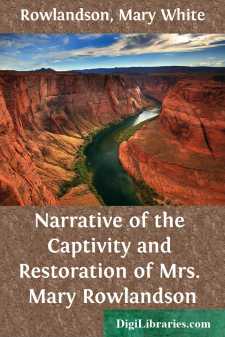History
- Africa 30
- Americas (North Central South West Indies) 50
- Ancient 68
- Asia 58
- Australia & New Zealand 8
- Canada 41
- Caribbean & West Indies 1
- Civilization 20
- Eastern Europe 12
- Europe 310
- Expeditions & Discoveries 60
- General
- Historical Geography 1
- Jewish 9
- Latin America 3
- Medieval 8
- Middle East 13
- Military 248
- Revolutionary 8
- Study & Teaching 5
- United States 353
- Western Europe 56
- World 13
General Books
Sort by:
'They were men whose fathers were men'TO make it clear how Major Wilson and his companions came to die on the banks of the Shangani on December 4, 1893, it will be necessary, very briefly, to sketch the events which led to the war between the English settlers in Mashonaland in South Africa and the Matabele tribe, an offshoot of the Zulu race.In October 1889, at the instance of Mr. Cecil...
more...
by:
E. R. Billings
THE TOBACCO PLANT. Botanical Description — Ancient Plant-Bed — Description of the Leaves — Color of Leaves — Blossoms — The Capsules and Seed — Selection for Seed — Suckers — Nicotine Qualities — Medicinal Properties — Improvement in Plants. CHAPTER TOBACCO. ITS DISCOVERY. Early Use — Origin of its Name — Early Snuff-Taking — Tobacco in Mexico — Comparative Qualities of...
more...
INTRODUCTORY NOTE. he repulse of a British squadron, at Stonington, by a few undisciplined volunteers, having only two effective guns, imperfectly protected by a low earth-work,—and this repulse accomplished without the loss of a single life,—was not the least glorious achievement of the War of 1812-14. The fiftieth anniversary of the action is close at hand. Few who witnessed,—only three or four...
more...
by:
Evelyn Baring
I THE GOVERNMENT OF SUBJECT RACES "The Edinburgh Review," January 1908 The "courtly Claudian," as Mr. Hodgkin, in his admirable and instructive work, calls the poet of the Roman decadence, concluded some lines which have often been quoted as applicable to the British Empire, with the dogmatic assertion that no limit could be assigned to the duration of Roman sway. Nec terminus unquam...
more...
CHAPTER I THE COURTS AND BUILDINGS S t. John's College was founded in 1511, in pursuance of the intentions of the Lady Margaret Beaufort, mother of King Henry VII. Approaching the College from the street we enter by the Great Gate. The gateway with its four towers is the best example of the characteristic Cambridge gate, and dates from the foundation of the College. It is built of red brick (the...
more...
by:
Cyrus MacMillan
PREFACE The following pages give in general outline the century story of McGill University. They have no pretension to the title of detailed History, for it has been possible to chronicle only the circumstances which shaped the University in its infancy and the important events of its succeeding years. The story is one of struggle and disappointment, of discouragement and controversy, and of ultimate...
more...
by:
Owen Wister
I: A Word about My Aunt Like Adam, our first conspicuous ancestor, I must begin, and lay the blame upon a woman; I am glad to recognize that I differ from the father of my sex in no important particular, being as manlike as most of his sons. Therefore it is the woman, my Aunt Carola, who must bear the whole reproach of the folly which I shall forthwith confess to you, since she it was who put it into...
more...
INTRODUCTION n every century for more than two thousand years, many men have owed their chief enjoyment of life to books. The bibliomaniac of today had his prototype in ancient Rome, where book collecting was fashionable as early as the first century of the Christian era. Four centuries earlier there was an active trade in books at Athens, then the center of the book production of the world. This...
more...
by:
George Forbes
1. PRIMITIVE ASTRONOMY AND ASTROLOGY. The growth of intelligence in the human race has its counterpart in that of the individual, especially in the earliest stages. Intellectual activity and the development of reasoning powers are in both cases based upon the accumulation of experiences, and on the comparison, classification, arrangement, and nomenclature of these experiences. During the infancy of...
more...
THE FIRST REMOVE Now away we must go with those barbarous creatures, with our bodies wounded and bleeding, and our hearts no less than our bodies. About a mile we went that night, up upon a hill within sight of the town, where they intended to lodge. There was hard by a vacant house (deserted by the English before, for fear of the Indians). I asked them whether I might not lodge in the house that...
more...



